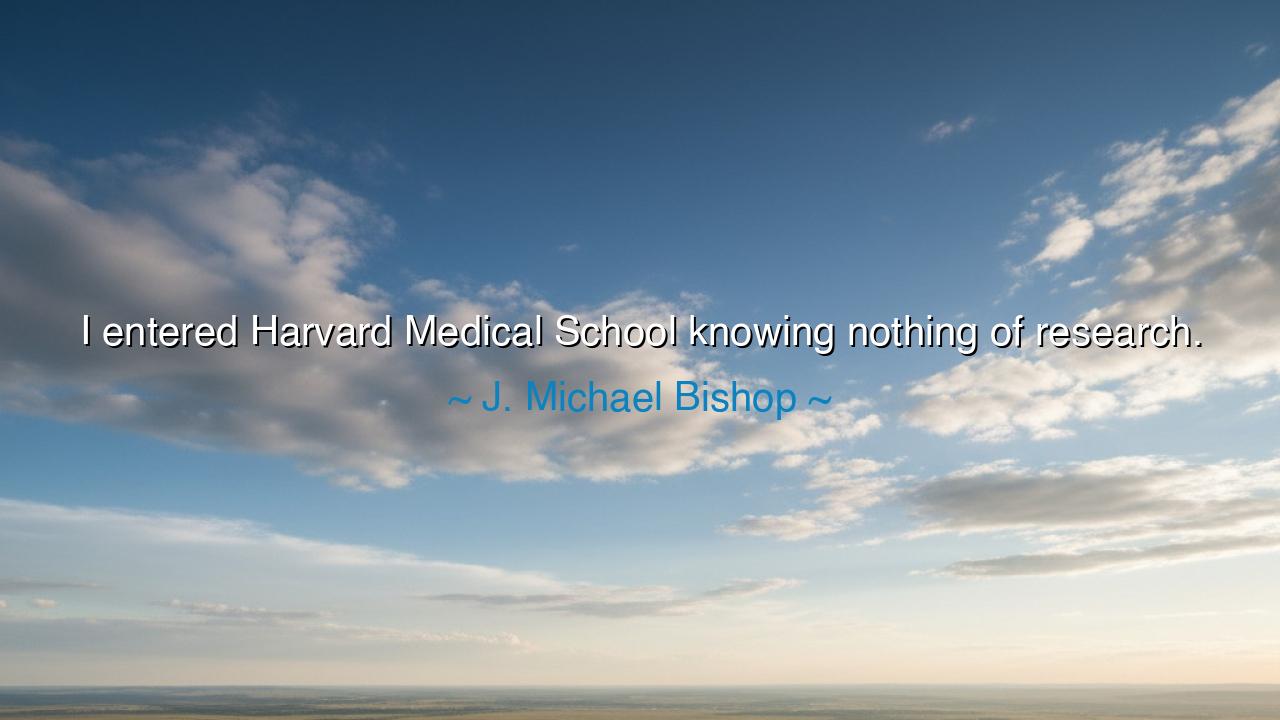
I entered Harvard Medical School knowing nothing of research.






Hear the words of J. Michael Bishop, physician, teacher, and Nobel laureate, who once declared with striking humility: “I entered Harvard Medical School knowing nothing of research.” In these words is the essence of the human journey, for he who would later unlock the secrets of cancer and win the highest honors of science began in ignorance, unarmed with knowledge of inquiry. He speaks not with shame, but with wonder, showing that greatness is not born in certainty but in openness to growth.
The origin of this quote lies in Bishop’s early years as a student of medicine. He had set his path toward healing the sick, expecting to study diagnosis and treatment as countless others had done before him. Yet he confesses that he began his time at Harvard without knowledge of research, the art of questioning nature itself, of peering into the mysteries beyond what is already known. It was only later, guided by mentors and his own restless curiosity, that he came to see research as his destiny. His discovery, alongside Harold Varmus, that normal cellular genes could become cancerous, reshaped medicine forever. From ignorance, he rose to transform the world.
The ancients, too, understood this paradox: that wisdom begins not with knowledge but with the admission of not knowing. Socrates, the philosopher of Athens, declared that his only wisdom was to know that he knew nothing. This confession, like Bishop’s, was not weakness but strength. For the one who humbly admits ignorance is the one whose vessel is empty enough to be filled. The proud, who claim to already know, cannot learn; the humble, who confess their lack, are open to the infinite.
Consider the story of Michael Faraday, the great scientist of electricity and magnetism. He began as a bookbinder’s apprentice, knowing nothing of physics, nothing of research. Yet he read the books he bound, attended lectures, and slowly trained his mind in the language of science. From ignorance he rose to greatness, his discoveries paving the way for the very electricity that powers our age. His life and Bishop’s confession bear the same truth: the seed of greatness often lies in the soil of humility.
The meaning of Bishop’s words is a torch to all who doubt their beginnings. He shows us that to start with nothing is no disgrace. What matters is not the knowledge you possess at the threshold, but the hunger you carry within. Research, whether in science or in life, is born of questions, of curiosity, of the courage to say, “I do not know—but I will seek to learn.” To enter any path empty-handed is no failure; it is the natural state of every pilgrim on the road to mastery.
The lesson is clear: do not be paralyzed by the fear of ignorance. If you begin a new craft, a new discipline, or a new chapter in life, do not despair that you start from nothing. For nothing is the common beginning of all who have achieved greatness. What transforms nothing into something is persistence, humility, and the willingness to be taught. Bishop, Faraday, and countless others prove that the unknowing student can become the master, if only he does not turn away from the journey.
Practical action follows. When you encounter a field you do not understand, step into it with courage. Seek out mentors who will guide you, as Bishop found his. Study not only to pass examinations, but to ask deeper questions. And when you see others beginning in ignorance, do not scorn them—encourage them, for you see in them the reflection of every great learner who ever lived.
Thus, Bishop’s words resound as more than a recollection; they are a testament to the path of wisdom. He who began knowing nothing of research became one of the great discoverers of our time. Let us, then, embrace our own beginnings, however small or uncertain, with the same humility and resolve. For from the soil of ignorance, with patience and courage, can spring forth discoveries that change the fate of the world.






AAdministratorAdministrator
Welcome, honored guests. Please leave a comment, we will respond soon